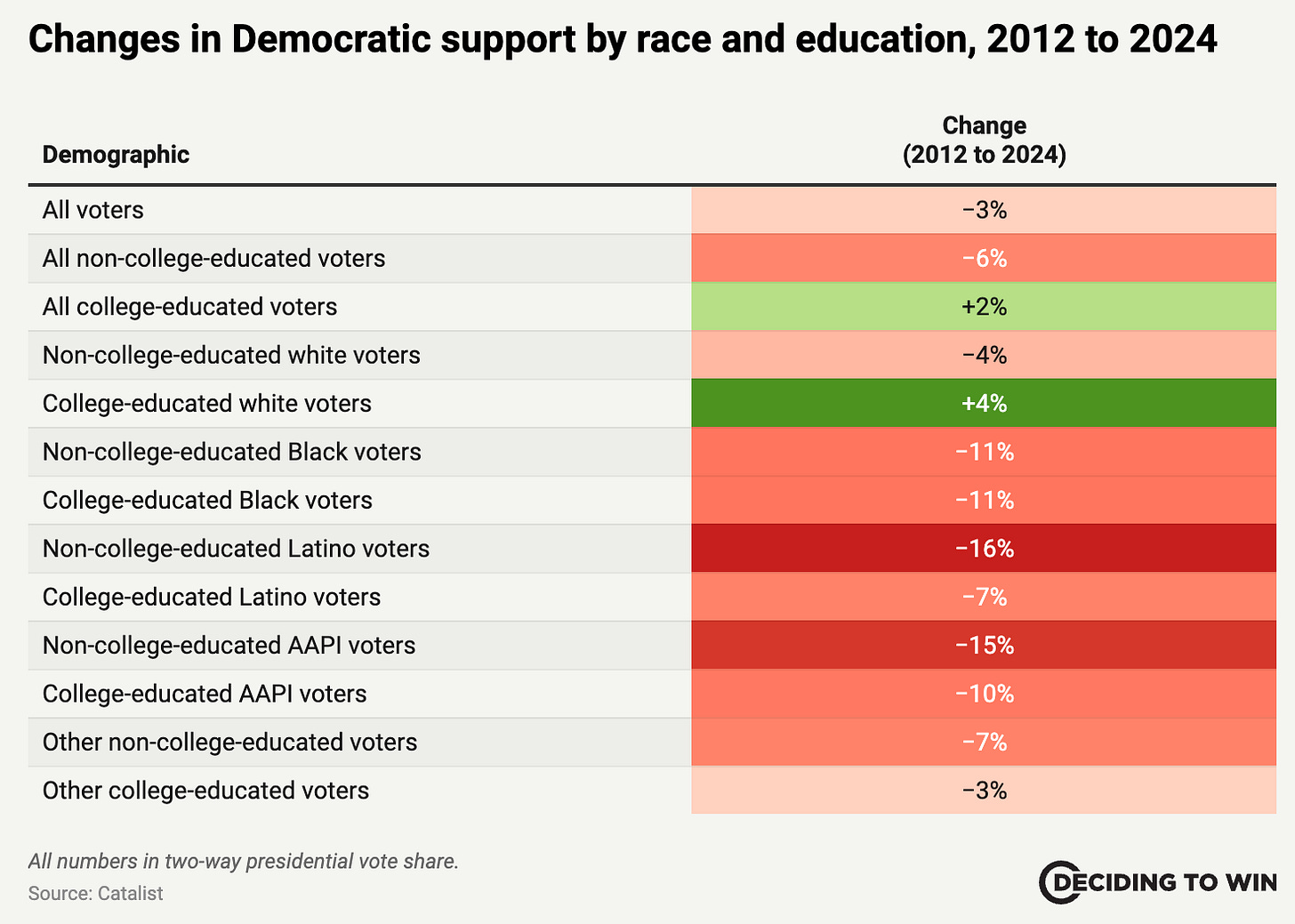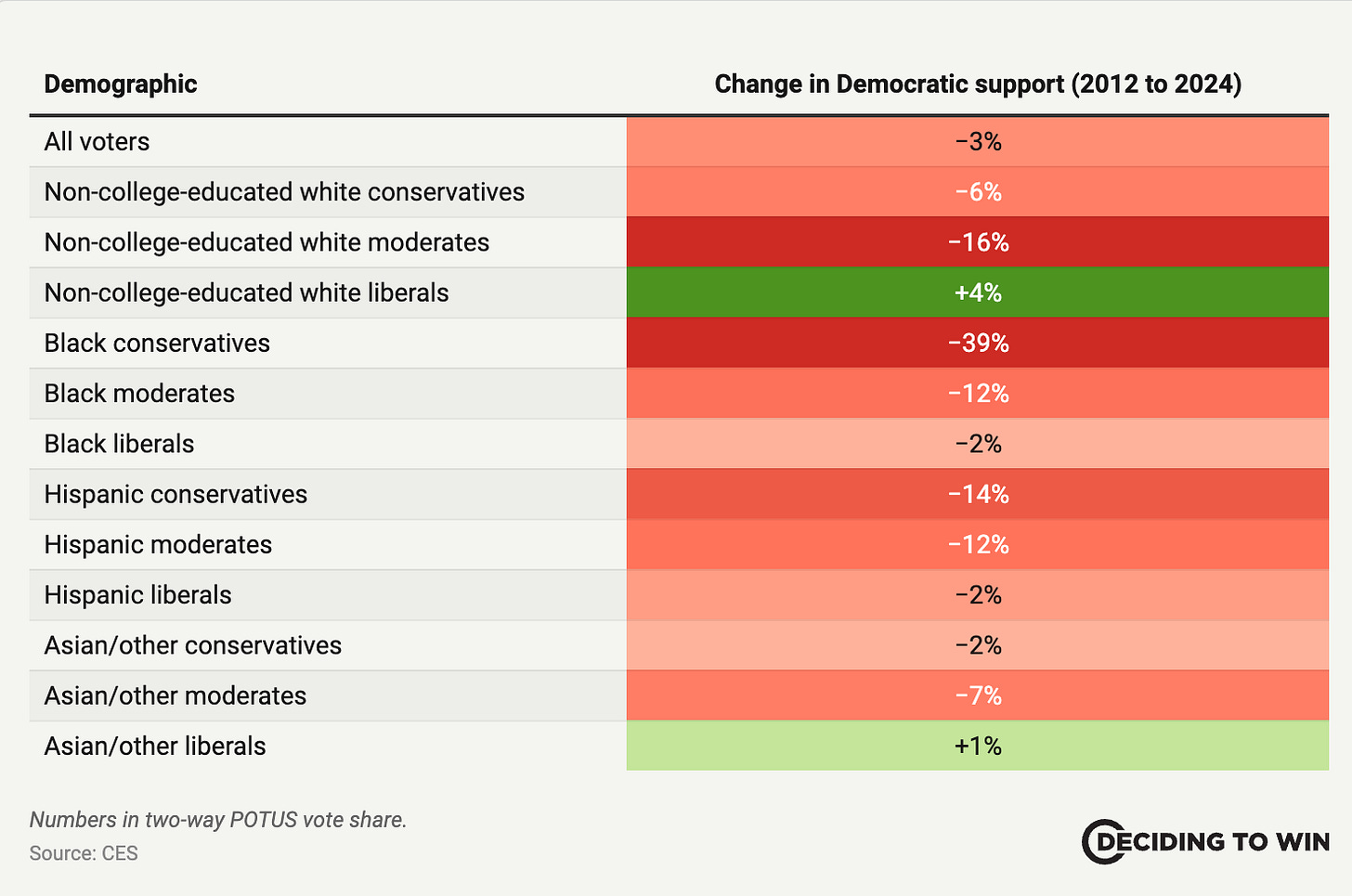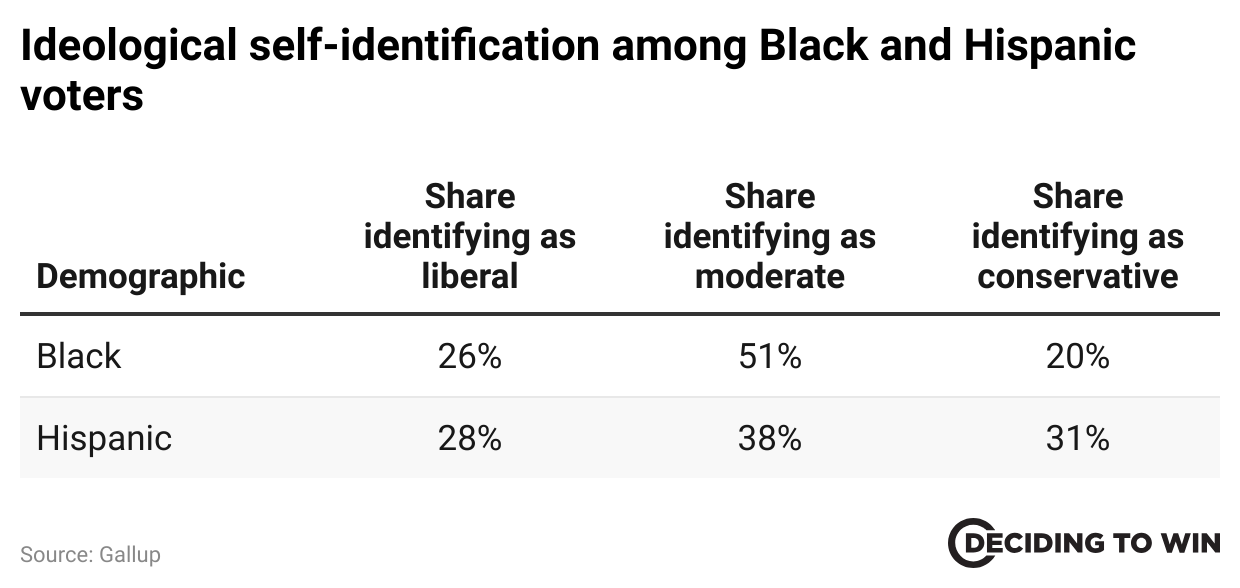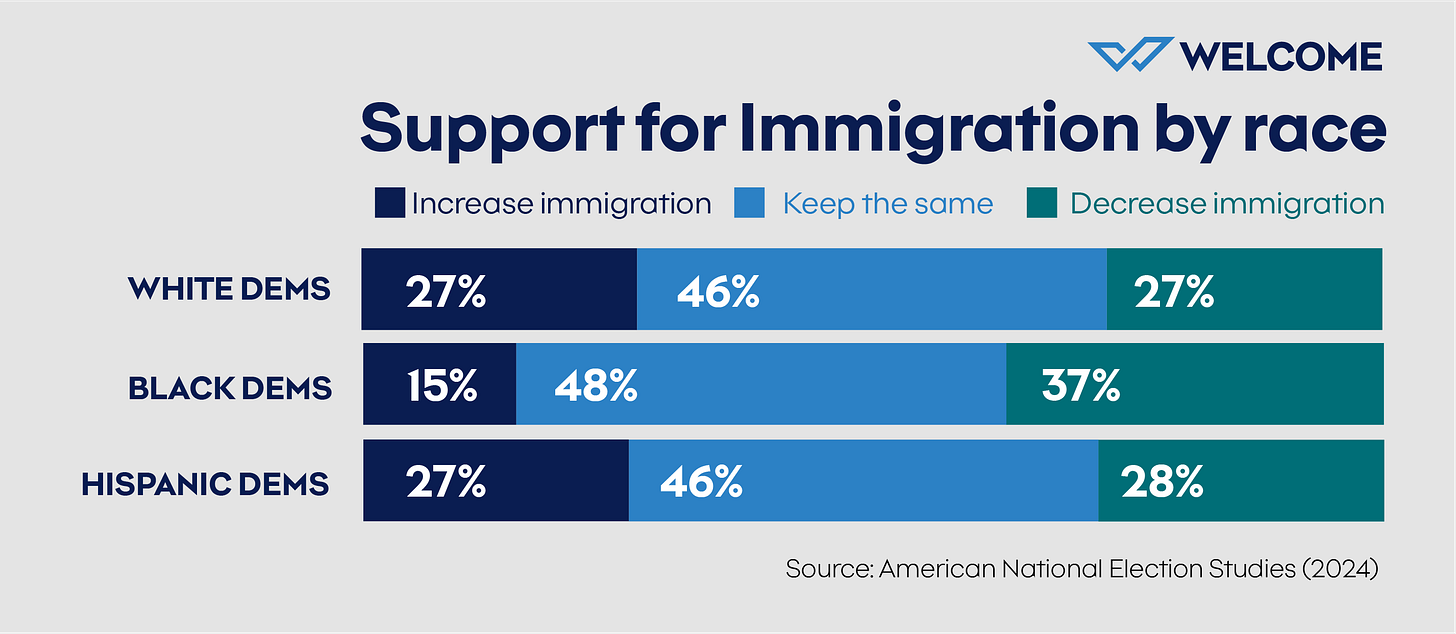How Democrats Lost Black and Hispanic Voters
Dems’ problem isn’t in turning out the base — it’s keeping voters of color in the base.
It’s something Democrats once thought unthinkable: in 2024, they lost vote share among Black and Hispanic voters in an election where Trump was on the ballot.
But these losses in particular have been piling up since 2012: Democrats have lost support among every race and college cohort except for college-educated white voters.
It’s not as if Democrats haven’t prioritized equality. On the contrary, references to phrases like “racial justice” and “equity” have increased dramatically from the mouths of and policy platforms of Democratic elected officials and candidates.
Of the millions of Black and Hispanic voters participating in each election cycle, the majority of those voters are moderate and more akin to independent voters than to white liberals. It’s a reality I’ve been preaching to political folks for years, highlighting that minority men in particular are swing voters. This past election cycle, we saw that to be true.
Democrats have yet to fully grasp that Black and Hispanic voters aren’t liberal. As I wrote for Slow Boring two years ago:
Among Democrats and Democratic-leaning Independents, Black voters are the racial demographic least likely to identify as “liberal.” Only 29% of Black Democrats call their ideology “liberal,” compared to 37% of their Hispanic counterparts and a whopping 55% of white Democrats and Dem-leaners (Pew Research). A plurality (43%) called themselves “moderate,” and one in four (25%) identified as “conservative.” In the aftermath of Rep. Jim Clyburn’s tide-shifting endorsement in the 2020 Democratic primary, a clear majority of Black voters in South Carolina (61%) voted for Joe Biden, elevating him over Far Left favorite Bernie Sanders and putting him on track to the White House.
For decades, many Black and Hispanic Americans voted with Democrats because of long-held traditions. But as the party kept moving further to the left, Black and Hispanic voters became increasingly alienated.
Take Black voters, which the media imagines to be a leftward force in the party: Even among Democrats and Democratic leaners, Black voters are moderate on many issues. Black Democratic voters are significantly more likely to express support for increasing the number of border patrols on the US-Mexico border (63%) than their white (47%) and Hispanic (50%) counterparts. In the 2024 American National Election Studies (ANES) data, white Democrats are more supportive of increasing immigration rates than Black and Hispanic Democrats.
Black and Hispanic voters are also skeptical of the Democratic Party’s shift to the left on social issues like transgender athletes and abortion. And as many know, many Hispanic voters are concerned about Democrats’ calls for socialism due to family histories fleeing socialist countries like Cuba and Venezuela.
On the issue of crime, Black and Hispanic voters are supportive of public safety and don’t want to be victimized by the types of violent crimes Democrats are deprioritizing. Black and Hispanic voters also make up population majorities in the border districts most affected by illegal immigration.
Taking a look at how the Democratic Party platform discusses economic opportunity is a good way to illustrate one way the party is alienating people of color — working class voters in particular.
We see an America with greater economic security and opportunity, driven by education, energy, innovation and infrastructure, and a tax code that helps to create American jobs and bring down the debt in a balanced way. We believe in deficit reduction not by placing the burden on the middle class and the poor, but by cutting out programs we can’t afford and asking the wealthiest to again contribute their fair share.
We are also working to connect communities that have been isolated from opportunity for too long. Highways and rail lines have disproportionately torn through Black, Latino, and low-income areas; displacing and segregating residents and businesses; stifling economic growth and investment; and cutting people off from groceries, jobs, and health care. Through the Bipartisan Infrastructure Law, we are righting those historic wrongs by investing in new roads, bridges, railways, and public transit and more,
The 2012 Democratic Party platform weaves deficit reduction into opportunity. The 2024 Democratic Party platform disconnects with voters by talking about literally building bridges.
It’s no surprise that many of the most moderate Democrats in the House are border state Members like Rep. Vicente Gonzalez, and Trump-won district Members like Rep. Don Davis.
If Democrats Decide to Win, they need to understand that Black and Hispanic voters are not progressive activists; they’re the moderate and conservative voters who want to feel a sense of belonging in the Party that claims to represent their interests.







Democrats didn’t just lose Black and Hispanic voters; we lost the stories we were telling ourselves about them.
For years, the party treated race as a stand-in for ideology. We assumed Latino identity meant support for progressive immigration policy, and Black identity meant alignment with elite progressive views on policing, gender, or affirmative action. But as Lauren shows, the median Black or Hispanic voter isn’t a progressive activist. They are moderates, often culturally conservative, judging politics through class, stability, and lived experience far more than ideology.
One moment that stuck with me came when a friend in Austin admitted how shocked she was to see a Black woman wearing a MAGA hat. Her reaction wasn’t malicious; it revealed how deeply many Democrats have internalized the idea that identity predicts ideology. It doesn’t. It never has.
My research shows Democrats get in trouble whenever we mistake advocacy-group narratives for what voters actually want. Immigration makes this obvious. While progressive groups pushed the party left, long-settled Latino citizens were often more enforcement-oriented than white liberals. The same pattern appears with Black voters on school choice, voter ID, gender issues, and policing.
These voters aren’t moving right. They were never as ideologically uniform as the party assumed.
People need to be seen. Not as symbols or members of a monolithic group. Not as demographic assets, but as individuals with their own priorities. When we flatten them into categories, we lose them, and we shouldn’t be surprised when it happens.
Love this analysis. But can’t figure out how the data below the quote support “white Democrats are more supportive of increasing immigration rates than Black and Hispanic Democrats.” As presented, it’s 27% support for white and Hispanic. And in the Hispanic row, the other categories don’t seem right. Thanks for this article, but I want to look up this data to make sure it’s right.